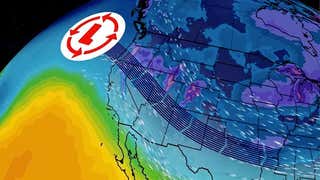

US
°C





France's vineyards may be short-lived if the warm temperature trend continues. (iStock/maximkabb)
Climate change is bringing both good and bad news for lovers of French wine.
When it comes to good wine, high quality wines have been associated with early harvests, CNBC reports. Now that warmer-than-average temperatures have become more common and more prolonged, early harvests occur regularly. Whereas before, a drought was necessary to produce hot enough temperatures to make the grapes mature quickly, now climate change has done its part in bringing about the hot temperatures sans droughts.
Vineyards in the Champagne region in France are especially sensitive to changes in the climate, because they have to be grown in very specific areas and conditions. (Francois Nascimbeni/AFP/Getty Images)
The pro: quality wine has become tastier and more abundant than ever before. The con: time may be running out for these highly-rated wines.
In a new study in the journal Nature Climate Change, researchers compared harvest dates to climate data from 1600-2007 in France and Switzerland.
They found a turning point after the year 1980, when harvest dates started occuring substantially earlier, and not necessarily coinciding with drought, indicating a strong impact of climate change on the vineyards. The researchers say it's a fundamental shift.
"Before 1980, you basically needed a drought to generate the heat to get a really early harvest," Benjamin Cook, a climate scientist with NASA's Goddard Institute for Space Studies in New York City and co-author of the study, told NPR. "But since 1980, it's been so warm because of climate change that you can get the hot summers and really early harvests without needing a drought."
(MORE: Could Climate Change Kill Off These Foods?)
It may bode well for some grape varietals for now, but it's not guaranteed to last.
“The trend, in general, is that earlier harvests lead to higher-quality wine, but you can connect the dots here," a co-author of the study, Dr. Elizabeth Wolkovich of Harvard University, told The Guardian. "We have several data points that tell us there is a threshold we will probably cross in the future where higher temperatures will not produce higher quality.”
Wolkovich likened wine grapes to canaries in coal mines. They are an indicator of the climate, and vise versa.
"If we keep pushing the heat up, vineyards can’t maintain that forever," the study's lead author, Benjamin Cook of Columbia University, told Discovery News.
MORE ON WEATHER.COM:
By 2050, climate change will shrink by as much as 73 percent the current area suitable for wine grape growing around the world, according to a study by Conservation International. In this photo, wine grapes grow in a vineyard in Greece. (© Nick Allen, via Conservation International)












